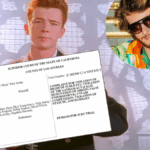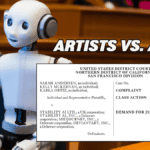Model Gigi Hadid defaults in a copyright lawsuit over an Instagram post, leading to a judgment of only $3,000 in damages. Was it a savvy strategy or just a lucky break?

Gigi Hadid is no stranger to copyright lawsuits. Over the years, the fashion model has faced repeated claims from paparazzi photographers for posting their images on her Instagram without permission. She won one of these cases, settled two others, and likely paid hefty legal bills in all three. Each of these lawsuits involved a familiar scenario, putting Hadid squarely in the “I got sued for posting pictures of myself on social media” club—a club that’s now about as exclusive as a Sam’s Club membership.
Last August, Hadid was sued yet again, this time for sharing a 2020 photo of her sister Bella—another frequent copyright defendant—taken by photographer Ulices Ramales. But this time, Hadid didn’t settle or litigate. She didn’t even hire a lawyer. She simply didn’t respond to the complaint at all, resulting in a default judgment. The court awarded Ramales just $3,000, a fraction of the $30,000 he’d requested, along with a downright reasonable $1,140 in attorneys’ fees and $440 in costs.
Hadid got off easy—though not as easy as actress Sofia Vergara. In a case I wrote about a few years ago, Vergara also let a copyright lawsuit over an Instagram post slip by, resulting in only a $750 judgment with no fees awarded. While two cases don’t exactly make a trend, they do raise the question: Could defaulting be a viable strategy for celebrities and other defendants facing similar claims, or is it simply a game of copyright roulette?

Ramales v. Hadid: The Motion For Default Judgment
In her previous copyright lawsuits, Hadid mounted spirited defenses, once even arguing that by stopping and posing, she contributed to a photo’s protectable elements. So, her no-show in this case is surprising. It’s unclear whether Hadid was aware of Ramales’s copyright lawsuit and intentionally chose not to respond or if she was blissfully unaware of its existence. (The summons was reportedly left with her apartment concierge.) Either way, Hadid didn’t appear, and the clerk entered her default.
Ramales then moved for default judgment, seeking $30,000 in statutory damages and urging the court to find willful infringement based on Hadid’s failure to appear. (Curiously, he didn’t mention any of her past copyright lawsuits with other paparazzi.) And while plaintiffs often use lost licensing fees as a baseline for statutory damages, Ramales didn’t provide any licensing history for the image here. Although not required, the absence of this type of proof may result in a lower statutory award unless a defendant’s conduct is particularly egregious.
In her ruling (read here), Southern District of New York Judge Naomi Reice Buchwald noted that Ramales hadn’t provided any evidence that Hadid knew her actions were infringing or that she acted recklessly. Ramales could have tried to obtain this evidence via discovery had Hadid participated in the case. Instead, Judge Buchwald remarked that Hadid’s absence made it “difficult to evaluate” the factors relevant to statutory damages. Ultimately, she opted for a low-end award of only $3,000—well below the $30,000 Ramales had requested.
The Default Strategy: What Makes It Tempting?
While unschooled defendants may decide to ignore a summons and complaint filed against them, it rarely happens with sophisticated companies, let alone celebrities with substantial assets. That said, it’s easy to see why a public figure like Hadid might grow tired of what she likely views as shakedown suits. As her lawyer argued in a previous case, “It is one thing for paparazzi to take advantage of Ms. Hadid by surveilling her, taking photographs of her every public movement, and selling them for profit. It is quite another to demand damages based on an Instagram post by the very person whose image the photograph sought to exploit in the first place.”
For high-profile defendants, ignoring a copyright lawsuit might seem counterintuitive, but it does carry a certain appeal. Defaulting avoids the hefty costs of a full-blown legal defense—discovery, depositions, and court appearances—which can quickly run into tens or even hundreds of thousands of dollars in legal fees. It also keeps potentially embarrassing or private details from coming out in court or discovery, protecting a celebrity’s brand from unwanted scrutiny. And while the vast majority of these photo cases settle early, in my experience, copyright plaintiffs recently have been looking to extract increasingly steep settlements for the privilege of avoiding litigation. Considering all this, putting one’s fate in the hands of a (hopefully reasonable) judge can start to look awfully tempting.

When Ignoring a Lawsuit Might Backfire
Needless to say, defaulting isn’t for the faint of heart—or the risk-averse. For starters, it forfeits any chance to argue for reduced damages or to present defenses that could lead to dismissal or a smaller award. In a previous suit, Hadid argued that by posing for the paparazzi, she contributed creatively, suggesting she was a joint author of the photo. Though a stretch, it was at least an argument. Here, by ignoring the complaint, she took all defenses off the table.
For celebrities like Hadid, who frequently face lawsuits over social media posts, a default judgment also creates a public record of liability for future plaintiffs to leverage, potentially leading to higher statutory damages down the line. In addition, if courts perceive this as a growing trend, they may issue higher damages awards to discourage a “no-defense” approach. Some judges could interpret this as dodging accountability, which might result in harsher outcomes in future cases.
Default Judgments vs. Settlements: The Risk Calculation
It’s hard to directly compare default judgment awards to settlement amounts, as settlements are typically confidential. But based on my experience, a few insights can be drawn.
Settlements provide more certainty for defendants, allowing them to control costs and sidestep the risks that come with unpredictable judgment awards. In settlement agreements, defendants can negotiate terms, including confidentiality clauses and non-admission of liability—two major benefits that a public judgment lacks. That said, there are plenty of recent examples where courts have awarded statutory damages as low as $750 on default in single-photo cases. Single-photo settlements are rarely that low.
Default judgments, on the other hand, bring inherent risk. Courts have awarded anywhere from $750 to the maximum $30,000 for non-willful infringement in single-photo cases. While some courts keep awards low when plaintiffs fail to provide solid licensing evidence, others award much higher sums, especially when attorney’s fees and costs are added.
Moreover, unlike confidential settlements, default judgments become public record, which can invite collection efforts, wage garnishments, or liens on property. For defendants weighing their options, the choice to default may save on legal fees in the short term but could bring far greater financial and reputational risks if the court’s ruling doesn’t go their way.
The Bottom Line
One potential solution is to fast-track these cases to a damages finding. A defendant could stipulate to liability in order to avoid litigation costs. However, this approach has downsides—plaintiffs will likely still seek discovery to prove willfulness, so it may not significantly reduce time or expense. And while the Copyright Claims Board (essentially a small claims court for copyright cases) offers a streamlined option, both sides must agree to use it.
So what do you think? Should a copyright defendant ever consider strategically defaulting? Let me know in the comments below or @copyrightlately on social media. In the meantime, here’s a copy of the court’s order in Ramales v. Hadid.
View Fullscreen






3 comments
A few thoughts:
As you suggest, if a trend of strategic defaulting developed among celebrities (quite possible in an Internet world), I can definitely see a trend developing among judges to counter it with larger awards. Judges can easily take offense if they perceive that celebrites aren’t “showing up” the way “normal” people do when served with court papers. I suppose a similar if smaller “offense” risk applies to an individual case in the absence of a trend–though from your article I infer that there is, as yet, no pattern of higher awards in default cases.
Another risk? If there is an inappropriately large award in a default case, isn’t the result harder to appeal? You’d have to move to set aside the default, correct? And with something more sympathetic than “I was counting on saving legal fees.”
Also, there is some value to a celebrity in developing a reputation as a fighting defendant. Of course, in that regard, it helps to have an actual valid defense. While photographers who take and exploit photos of celebs without permission may or may not be deserving of praise, I don’t think the copyright law excludes protection for their works.
Putting it all together, if I were approached for advice by the sued celeb, I’d probably advise the client to seek a settlement this time–and to not use paparazzi photos in the future without permission.
Only a deep pocket would be willing to let some potentially unpredictable judge exercise unappealable discretion (up to $30K plus fees), when the alternative is a manageable known settlement amount. These claims will keep coming, until district judges start to find that filing these suits doesn’t warrant a windfall for the litigant or the lawyer.
Given the developing state of the law on copyright statute of limitations, website owners should regularly cull their sites. Too often, they are sitting on needless exposure to dubious claims. Fair use is a wonderful doctrine, but being forced to litigate it effectively defeats its purpose.
Hi Vincent! Remember that Elvis impersonator case we had, 30 years ago? That was funny.
You are right, of course, no copyright lawyer would recommend letting a case with a pre-infringement registered copyright go to default. Too unpredictable. On the other hand, if one is absolutely sure there was no registration prior to the alleged infringement, and the matter is otherwise minor, it might be an interesting exercise.